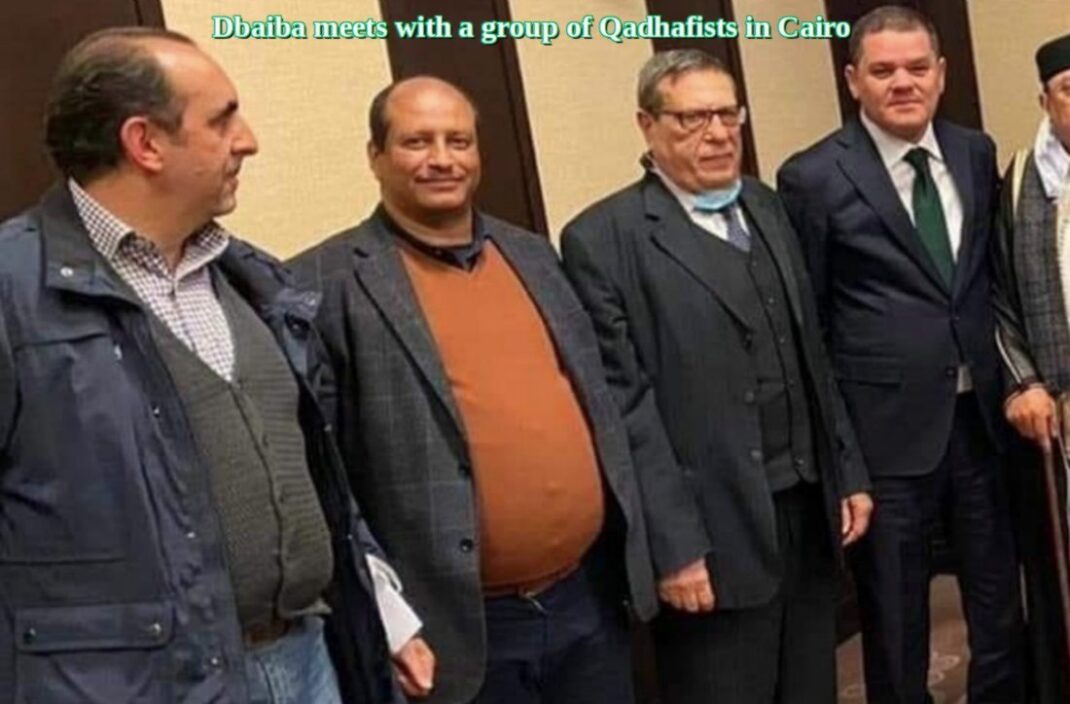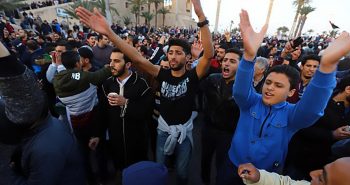By Daniel O’Connell & Ehsan Salah
 “We are expecting that the Geneva process will fail,” one Egyptian official told Mada Masr at the time.
“We are expecting that the Geneva process will fail,” one Egyptian official told Mada Masr at the time.
PART TWO
In the years following the revolution, Dbaiba was the subject of investigations into charges of embezzlement, and Interpol issued a red notice for his cousin on charges of embezzlement, money laundering, and abuse of power.
However, in the ensuing violence and political and social fragmentation, the investigations into the Dbaiba family never progressed, and, according to a source close to the family, the appointed prime minister has been working over the last four years to return to relevancy, establishing contacts with a number of Libyan political Islamist figures residing in Turkey, such as Ali al-Sallabi.
Dbaiba’s cousin entered into an alliance with Libyan figures linked to Qatar and Turkey to form the Peace and Reconciliation political bloc in 2018 that garnered support from figures not only from the GNA in Tripoli but from different currents in Libya, the source close to Dbaiba says.
A media figure that was close to the Qadhafi regime adds that he received an invitation at the close of 2018 to travel to Turkey to attend a workshop titled “Peace and Reconciliation,” which Ali was heading. Dbaiba’s cousin was promoting the initiative among several circles in Libya, including those that are considered remnants of the Qadhafi regime, the media source says.
When Ali was selected as a member of the LPDF last year, he served as a key catalyst to secure a victory for Dbaiba, according to the source close to the family.
The allegations of corruption surrounding a figure like Dbaiba highlight the crucial flaw in the Geneva process. For Elham Saudi, the director of Lawyers for Justice in Libya and a member of the LPDF who abstained from voting, the process should have been framed as a public appointment with a rigorous vetting process, rather than a vote.
A bloc of LPDF members fought for stauncher eligibility criteria for candidates in the process, which would have included barring anyone who had been investigated for rights violations or corruption, she says — however, the UN process ultimately settled on language that was merely a “nod to weeding out those convicted for violations, which is meaningless and created the lowest of bars to entry,” effectively opening the door to a host of candidates.
Now that Dbaiba is in the door, several factors may see him stay longer than his mandated time in office.
The LPDF roadmap states that the Dbaiba government should lay the groundwork for elections in December 2021. However, the legal justification for the elections remains unclear. A joint committee of members from the House of Representatives and the High Council of State had been holding consultations hosted by Egypt on a constitutional draft to provide a legal basis for holding elections. However, that process failed to provide a defining proposal by the mid-February deadline and the task will now rest with the LPDF.
For Tarek Megerisi, a policy fellow at the European Council on Foreign Relations, there remain several obstacles to holding elections this year.
“The Islamist block is pushing hard for a constitutional referendum on the current draft, but that is far from assured, and if it did happen would inevitably postpone the elections due to the mechanics of holding a referendum and then an election for the positions it creates,” he says.
“If the other possibility of a limited constitution outlining basic rights, the offices of state and a process for its completion is used, then the electoral timeline will stay on track. But even then there still needs to be an electoral law, adequate campaigning time, safeguards for polls, and defenses against electoral fraud.
It’s a process that is already fighting the clock. If it has to fight Libyan authorities or intervening states too, then much like the last timetable for elections, this one will simply fizzle out too.”
Indeed, officials from several foreign capitals have communicated a lack of willingness to hold elections in December behind closed doors, according to the Egyptian researcher who spoke to Mada Masr on condition of anonymity.
This includes Egypt, according to what the Egyptian official tells Mada Masr. Cairo, the official says, is not prepared to move toward “rushed elections” in Libya, favoring instead a long-term transition process.
Dbaiba is also not very keen on holding elections this year, in Megerisi’s estimation. “His actions to build out a patronage network through a big government and an ambitious construction-heavy work plan are further testament to this. So far everything points to the idea that Dbaiba is here to stay and is planning for the long term,” he says.
Cairo was among the stops on Dbaiba’s brief tour of consultations in recent weeks. While in Egypt on February 18, he held a meeting with President Abdel Fattah al-Sisi.
According to a press release from Egypt’s presidential spokesperson, Dbaiba expressed his desire to establish “a comprehensive partnership with Egypt, with the aim of duplicating a successful model from its inspirational development experience, which has been realized in recent years under the leadership and vision of President Sisi, particularly with regard to restoring stability and security and initiating a development and reform process.”
Dbaiba also held meetings in Cairo with a number of Qadhafist factions that were arranged by Egyptian officials, according to a second Libyan political source. Photos of the meeting were published on social media and were confirmed by the Egyptian official.
According to the Libyan political source, Dbaiba’s consultations with the Qadhafists aimed to secure nominations from within their ranks for inclusion in his government, on the condition that they be capable of appealing to the broader Libyan public.
Egypt has been courting relations with the Qadhafists in the aftermath of Haftar’s failed bid to take Tripoli, a policy aim that intersects with Russia’s interests.
When asked about Dbaiba’s meetings with the Qadhafists, the Egyptian official said that Dbaiba “met with several Libyan groups, including but not only those who represent the former regime. Dbaiba wants to work with as many Libyan groups as possible to give himself a chance to succeed, to create a situation that is beneficial to all, which would eventually, or so he hopes, make all use of arms and force simply unnecessary.”
“Of course, Egypt too is working with the Qadhafists — with almost all factions,” the official added. “They are a big and very influential tribal component and cannot be reduced to the direct circle of the former ruler of Libya. They have been working very hard, especially during the past couple of years, to establish themselves as a firm player on the Libyan scene, and they have inroads with leading influential capitals, in the region and beyond.
They also have strong inroads with the gas and oil companies and the shipping companies and many other influential investors who eye Libya today as a possible goldmine.”
Economic cooperation was also a central concern in the meeting with Sisi, according to the Egyptian official briefed on the meeting. “Dbaiba’s focus was on building strong future relations anchored on economic cooperation,” the official says, adding that while he promised to acknowledge all Egyptian security concerns, he made no clear promises on eliminating the militias or exiting mercenaries.
Two western diplomats echo the focus on economic cooperation, saying the appointed prime minister has friends in the top ranks of the Egyptian business community.
Although Cairo preferred the Saleh-Bashagha list, it will deal pragmatically with Dbaiba, says the Egyptian researcher, who adds that cultivating ties with a Tripoli power bloc will help Egypt to bolster its influence, which has been waning in eastern Libya, where it has to compete with the Russians, the Emiratis, the French and the British for influence.
“Establishing a presence in Tripoli, if coordinated and capitalizing on the desire of some active forces in the Libyan west to open up to Cairo, would compensate for what Cairo has lost in Cyrenaica recently,” the researcher says.
While the Egyptian president communicated to Dbaiba that Cairo is open to working with the new Libyan government, Sisi also expressed that Cairo’s red lines are clear when it comes to any security incursions.
These red lines, however, may prove difficult for Egypt to maneuver around as it tries to leverage its influence in Libya in its diplomatic relations with a host of other actors, including the UAE, Russia and the United States. Egyptian officials have told Mada Masr Cairo is keen to position itself to cooperate with the United States on Libyan affairs.
“Egypt is under pressure from the US, with the new administration’s coldness toward Sisi compounded by their willingness to apply CAATSA sanctions as a warning against others who may be getting too close to Russia, as happened with Turkey recently,” says Megerisi.
US Secretary of State Antony Blinken raised concerns over human rights and concerns about Egypt’s potential procurement of Su-35 fighter aircraft from Russia in a call Tuesday with Foreign Minister Sameh Shoukry last week, the first official contact between the new administration of President Joe Biden and Egypt.
“Egypt has always maintained a good relationship with the Qadhafists, but they seem to be playing many different angles at once. They are improving their relationship with Turkey and Tripoli. There is alignment with Russia on the Qadhafists. And they would like to continue shepherding the economic process toward forgiving Haftar’s debts and opening up full economic integration for eastern Libya once more (for which America is crucial, as they are co-leading that process). Finally, they would like to see the LNA preserved and move beyond Haftar to retain the structure of Libya’s future armed forces,” says Megerisi.
“The big question,” he adds, “is what happens when one of Egypt’s big red lines are crossed on the security track, economic track or simply when it becomes uncomfortable because Tripolitania has become too overtly Turkish or it feels it has lost influence over the political process and gained what it wanted from the other tracks.
The fact that Egypt has cross-cutting ambitions with so many other interventionists means that there is a disaster waiting to happen unless someone can be there to referee.”
According to Egyptian officials, Cairo has not ruled out any scenario. It is hoping for the success of the new prime minister in Libya, but it also is closely monitoring the developments.
The possible re-inauguration of an Egyptian embassy in Tripoli, maybe sooner rather than later, is particularly designed to keep Egypt fully engaged in the Libyan political dynamics as they unfold.
___________




